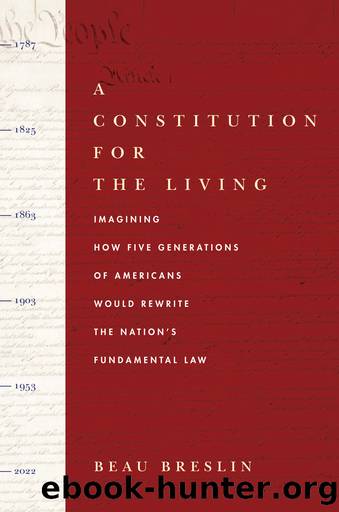A Constitution for the Living by Beau Breslin

Author:Beau Breslin
Language: eng
Format: epub
Publisher: Stanford University Press
Published: 2021-06-15T00:00:00+00:00
Not to be forgotten, toward the very end of the convention Booker T. Washington reminded the delegation of his proposed and then tabled motion on monopolies and workersâ rights. Nothing had occurred in the intervening months between his introducing the resolution and this moment to suggest that constitution-makers had a greater appetite for such an addition to the text. And yet even a delegation of 266 souls can surprise. Interest in anti-competition was evident in the assembly. It had always been so. Many were just not sure that the constitutional document was the proper place for such regulatory activityâpreferring the democratic process as the mechanism to control trusts instead. But these delegates wanted to rein in the power of the monopolistic corporations. Several spoke of pressure they felt from their home constituencies to harness the monopoliesâ economic influence. Others agreed with Washington and Lennon that some provision or clause related to workersâ rights was needed. The Progressive agenda was, at least outwardly, a worker-friendly agenda, they said. In the end, the delegation agreed to include only the language derived from the Sherman Antitrust Act in the new constitutional draft. From ratification forward, Congress would retain the constitutional authority to âoutlaw any contract, merger, conspiracy, or combination in the form of trust or otherwise, in restraint of free trade.â It was a victory for Washington and Lennon, though not a complete one. The idea that one could conceive of an individual constitutional right to do an honest dayâs work and earn an honest dayâs pay without harassment from management would have to wait.
* * *
The 1903 federal Constitutional Convention witnessed many firsts. It was the first constitutional convention in U.S. history to welcome people of color. It was also the first to be illuminated by the awesome power of electricity. It was the first at which a few delegates arrived by automobile. The mass-produced and affordable Model T was still a few years off, but the Studebaker was available for use. A handful of delegates arrived in, and departed from, Philadelphia in these new and fascinating machines. This convention was also the first to allow outsiders, including the press, to witness the deliberations. It was the first to employ the use of a telephone, and the typewriter, and the paperclip.
And yet in many ways the 1903 federal Constitutional Convention in Philadelphia resembled all the others. It was influenced by a political landscape that was not level. Partisanship reigned. Republicans (especially northern Republicans) seemed to have the upper hand in deliberations with southern Democrats. Progressive Republicans controlled Congress and the White House, and that control translated into Progressive triumphs at the constitutional convention. Those who were aligned with the sitting President were more likely to taste victory than those who werenât. Efforts to raze the prior Constitution altogether and take a fresh look at what a twentieth-century generation might desire failed because of expediency and because of a belief that the basic architecture of the American political system still functioned reasonably well. Politicians at the convention were still influenced by their reputations.
Download
This site does not store any files on its server. We only index and link to content provided by other sites. Please contact the content providers to delete copyright contents if any and email us, we'll remove relevant links or contents immediately.
Constitutional Law by Erwin Chemerinsky;(174)
European Witch Trials (RLE Witchcraft) by Richard Kieckhefer(169)
Solve Your Money Troubles by Amy Loftsgordon;Cara O'Neill;(168)
Sentencing and Artificial Intelligence by Ryberg Jesper;Roberts Julian V.;(164)
Roman Law and Economics by unknow(158)
Dictionary of American Criminal Justice by Dean J. Champion(153)
Juvenile Risk and Needs Assessment by Christopher J. Sullivan Kristina K. Childs(142)
A Constitution for the Living by Beau Breslin(142)
Policing the Police : Knowledge Management in Law Enforcement by Petter Gottschalk(142)
Zionism, Palestinian Nationalism and the Law: 1939-1948 by Steven E Zipperstein(138)
The Supreme Court's Role in Mass Incarceration by William T. Pizzi(135)
Incarceration without Conviction by Mikaela Rabinowitz(135)
Crime and the Life Course by Michael L. Benson(132)
Lawyers, Lead On by Williford Rebecca S.;Basas Carrie A.;Enyart Stephanie L.;(132)
Law for Student Police Officers by Merritt Jonathan;(132)
The Eternal Criminal Record by James B. Jacobs(131)
The Legal Guide for Museum Professionals by Courtney Julia;(129)
Revitalizing Victimization Theory by Travis C. Pratt Jillian J. Turanovic(125)
Juvenile Homicides : A Social Disorganization Perspective by Minna K. Laurikkala(124)
